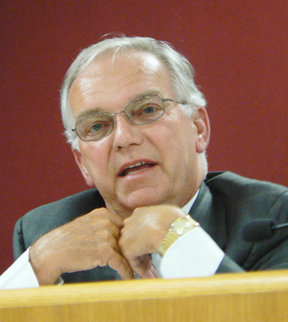With the municipality and the Secaucus school board each proposing tax increases in their upcoming budgets, taxpayers may wonder whether money could be saved if the two public entities fostered more interlocal agreements to reduce spending.
But as a result of a heated verbal exchange at the April 12 Town Council meeting between school board trustee Thomas Troyer, Deputy Mayor John Bueckner, and Mayor Michael Gonnelli, it appears the two entities are having difficulties reaching interlocal agreements on some services and benefits, perhaps missing some opportunities to save money in the process.
Already the entities – in addition to the Secaucus Housing Authority and the Secaucus Municipal Utilities Authority – have an interlocal agreement to share a handful of professional services. For example, the entities all share the same plumber, carpenter, and painter on an as-needed basis. And there are tentative plans to also share a contract for HVAC maintenance.
But there apparently remain some sticking points, sticking points some on the Town Council believe costs taxpayers money that could be saved. But some school board trustees say the council members’ assessment of the situation is inaccurate.
Health care the biggest expense
Services where no interlocal agreements have been worked out include health care, use of facilities, landscaping, and bus service.
Under the proposed 2011 municipal budget, which the council expects to pass this week, the increase in health insurance premiums for town workers is about four percent – not bad considering some employers have seen their premiums jump as much as 30 percent in recent years.
Mayor Michael Gonnelli – who sits on the town’s shared service committee, along with Troyer, council members Susan Pirro and Gary Jeffas, and school board Trustee Mary Ann Weiner – said, “We wanted to pool all the workers. We wanted to pool the town workers and the school board employees to see if we could get a better health insurance rate. [The municipality was] able to keep our increase low because we’re moving into a HIF,” a health insurance fund that pools many public employees from different municipalities under one provider.
“We wanted them to come into the HIF with us,” he said. “I think it would have saved money. If you look at their [proposed budget for school year 2011-2012], they’ve budgeted $800,000 for insurance increases.”
But two board members said last week such savings were unrealistic.
“We have in our contract [with teachers] language that says we have to offer insurance plans that are ‘the same or better.’ So, that’s a contractual agreement,” said school board Trustee Dora Marra, who has in the past sat on the Shared Services Committee and the Board of Education’s Finance Committee. “I don’t know that they have the same [language] in their contract.”
Such language also exists in the town’s contract with seven collective bargaining groups, according to Town Administrator David Drumeler and the mayor.
“When you go into a HIF, you can get a Pinto, or you can get a Rolls Royce,” said Gonnelli. “We’re going into the HIF with the same exact plan that we have right now, which is with Blue Cross.”
“Part of it is they wanted all this done, say, like, in January,” said Troyer. “But our administrator was sick. There was a lot going on with him. And he was trying to get our [2011-2012] budget together at the same time.”
Longtime school Business Administrator Edward Walkiewicz recently left work on sick leave. He was replaced by temporary Business Administrator Ron Smith, who had to quickly get up to speed on the school system’s budget.
An overhaul of the system’s health plan was not a priority given the staff change, said Troyer and Marra.
Residents will vote on the school budget this week and once a new school board is seated next month Marra said trimming health care expenses will be a greater priority for trustees and for Smith.
Nickel and diming?
But health care isn’t the only area where the two public entities have failed to see eye to eye.
The town provides landscaping services to the school district by taking care of athletic fields and school grounds, and the municipality uses the school’s buses. The two entities use each others’ building as well. The school district uses 20 Centre Ave., which is a municipal building, for its central offices, for example, and the municipality uses school buildings for meetings and community events.
The school system, according to Gonnelli and town Chief Financial Officer Margaret Barkala, bills the town for the use of some, though not all, of these services. For example, the school system recently sent the town a bill for about $50,000 for bus service.
“We could do the same thing to them,” Bueckner said after his April 12 exchange with Troyer. “We could bill them, for instance, for the use of the Rec Center. But we don’t because we know they’re using for the kids. But our feeling is they’re providing services for residents, we’re doing things for residents. And, really, all of these facilities belong to taxpayers and are maintained for residents.”
Gonnelli said he’d like to end the practice of billing for these services.
“I’m frustrated because some of these things are moving very slowly,” said Gonnelli. “But [Smith] has been very receptive to some of the changes we’d like to see. I expect very good things from him.”
Smith and Drumeler are now in the process of hammering out a revised interlocal agreement.
E-mail E. Assata Wright at awright@hudsonreporter.com.
